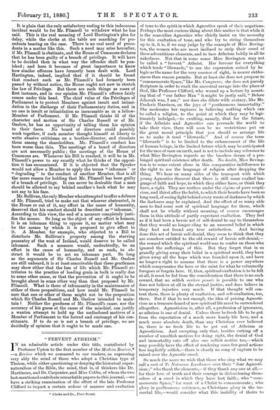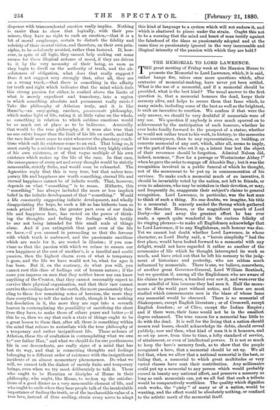"FERVENT ATHEISM."
IN an admirable article under this title, contributed by 1 an Upton to the first number of the Modern Review,* —a Review which we commend to our readers, as expressing very ably the mind of those who adopt a Christian type of Theism, while either questioning or denying the historical super- naturalism of the Bible, the mind, that is, of thinkers like Dr. Martineau, and Dr. Carpenter, and Miss Cobbe, of whom the two last-mentioned contribute remarkable papers to this journal,—we have a striking examination of the effort of the late Professor Clifford to impart a certain ardour of manner and exaltation
* Clarke and Co., Fleet Street.
of tone to the spirit in which Agnostics speak of their negations. Perhaps the most curious thing about this matter is that while it is the masculine Agnostics who chiefly insist on the necessity for this exaltation of tone, and who try to string themselves up to it, it is, if we may judge by the example of Miss Beving- ton, the women who are most inclined to strip their creed of these adventitious elements, and to face Atheism boldly in all its nakedness. Not that in some sense Miss Bevington may not be called a " fervent " Atheist. Her fervour for everything which tends " lifewards," to use the expression coined by he logic as the name for the very essence of right, is nearer enthu- siasm than reason permits. But at least she does not propose to "commemorate Space," like Mr. Congreve; she does not parody Scripture in order to exalt the ancestral savage into the place of God, like Professor Clifford, who wound up a lecture by assert- ing that of "our father Man" it might be justly said, " Before Jehovah was, I am;" nor does she dilate with ecstacy, like Mr. Frederic Harrison, on the joys of "posthumous immortality." She moderates her raptures in believing nothing which can be called a religion, to the point at which they may be legi- timately indulged,—to exulting, namely, that for the future, if the Atheists and Agnostics can persuade the world to take their view, there will soon be no restrictions put on the great moral principle that you should so arrange life as to make it tend " lifewards." And of course the term " lifewards " is to be limited to the enhancement of the life of human beings, in the limited future which may be anticipated for the race of man on earth, and is not to include any reference to what Miss Bevington regards as the baseless dream of a pro- longed spiritual existence after death. No doubt, Miss Beving- ton is to some extent alone in this comparative indifference to the right to use the language of religion after dropping the thing. We hear on many sides of the transport with which young Agnostics discover that there is still some exalted lan- guage of faith and hope, to which they either have, or think they have, a right. They are restless under the regime of pure scepti- cism, and thirst after the habit, to which their hearts have been so long used, of seeing light behind every waste of darkness by which the darkness may be explained. And the effort of so many able men to find some sort of spiritual language for them, which shall not be wholly without meaning, of course encourages them in this attitude of partly expectant exaltation. They feel as if it had been a heroic act of self-denial to say to themselves that they would no longer cling to an unsound belief in which they had not found any true satisfaction. And having done this act of heroic self-denial, they seem to think that they are somehow entitled to the old reward of heroic self-denial,— the reward which the spiritual world was to confer on those who ignored the sufferings of this. But they forget that in so grandly giving away their belief in a spiritual world, they have given away all the hope which was founded upon it, and have no longer a right to assume that there is a power anywhere which compensates the hero or the saint for what he voluntarily foregoes or forgets here. If, then, spiritual exaltation is to be felt at all, it must be fed from the consideration that there is no such reward, that no selfish arriere pewee is possible to one who does not believe at all in the eternal justice, and does believe in temporary injustice very much. If that thought will con- tent them, there is plenty of exaltation, and self-exaltation, too, there. But if that be not enough, the idea of prizing Agnosti- cism as a treasure-hoard of new spiritual life must be surrendered altogether. Agnosticism is, after all, a profession of ignorance, as atheism is one of denial. Unless there be fresh life to be got from the expectation of a much more lonely life here, and a much more absolute death, than any Christian ever believed in, there is no fresh life to be got out of Atheism or Agnosticism. And excepting only that, besides cutting off a number of unselfish motives for doing right, the denial of God and immortality cuts off also one selfish motive too,—which may possibly have the effect of rendering some few good actions less implicitly selfish,—there is clearly no song of rapture to be raised over the Agnostic creed.
So much the more we wish that those who sing what we may call a sort of Te Nainram LataatI1168 over their "dear Agnosti- cism ;" who thank the elements,—if they thank any one at all,— for their love of truth and their courage in disburdening them- selves of a creed in which they have lost faith ; who " com- memorate Space," for want of a Christ to commemorate ; who glory in posthumous existence, as Christians glory in the im- mortal life,—would consider what this inability of theirs to
dispense with transcendental emotion really implies. Nothing is easier than to show that logically, with their pre- misses, they have no right to such an emotion,—that it is a bit of moral surplusage, certain to disturb the fidelity and sobriety of their mental vision, and therefore, on their own prin- ciples, to be sedulously avoided, rather than fostered. If, how- ever, in spite of all logic, they cannot help seeking out some excuse for these illogical ardours of mood, if they are driven to it by the very necessity of their being, so soon as they begin to dwell on the authority of truth, and the ab- soluteness of obligation, what does that really suggest ? Does it not suggest very strongly that, after all, they are on a wrong track,—that there is something in the affinity for truth and right which indicates that the mind which feels this strong passion for either, is exalted above the limits of what is merely expedient and transitory, into a region in which something absolute and permanent really exists ? Take the philosophy of Atheism truly, and it is like Hume's,—an easy-going, careless, pococurante philosophy, which makes light of life, rating it at little value on the whole, as something in relation to which sublime emotions would be so mach out of place as to be ludicrous. Assuredly that would be the true philosophy, if it were also true that no one exists longer than the limit of his life on earth, and that the race itself must cease to exist whenever the planetary condi- tions which suit its existence come to an end. That being so, it must surely be a mistake for any man to think very highly either of his own existence, or of that vague multiple of his own existence which makes up the life of the race. In that case, the consequence of every act and every thought would be strictly measurable, strictly finite, and would soon be exhausted. The Agnostics reply that this is very true, but that unless tem- porary life and happiness are worth something, eternal life and eternal happiness cannot be of infinite worth. That, however, depends on what " something " is to mean. Hitherto, this " something " has always included the more or less implicit belief in the infinite development of that "something." Would a life constantly suggesting infinite development, and wholly disappointing the hope, be such a life as has hitherto been so mach prized? Hitherto, the greater part even of our finite life and happiness here, has rested on the power of think- ing the thoughts and feeling the feelings which testify to our not being intended for this small scale of things alone. And if you extinguish that part even of the life we have,—if you succeed in persuading us that the fervour with which truth is embraced, and the passionate sacrifices which are made for it, are rooted in illusion; if you con- vince us that the passion with which we refuse to ensure our own happiness at the cost of another's, is a fanciful and &mite passion, then the highest charm even of what is temporary is gone, and the life we have would not be, what for ages it has been. But if, on the contrary, do what you will, you cannot root this class of feelings out of human nature ; if the more you impress on men that they neither know nor can know anything of the Creator, that they cannot reasonably expect to survive their physical organisation, and that their race cannot survive the cooling-down of the earth, the more passionately they cling to these few remaining notes of heroism, the more they dare everything to tell the naked truth, though it has nothing but desolation in it, the more they are rapt into a seventh heaven in contemplating the possibility of sacrificing the short lives they have, to make those of others purer and better ;--if this be so, then we say that such a state of things ought to be a great lesson to them that, after all, there is something within the mind that refuses to assimilate with the true philosophy of a temporary and rather insignificant life. These ardours of Atheism, these fits of exaltation in contemplating what we owe to" our father Man," and what we should do for our posthumous life in our descendants, are really signs of a mind that has lost its way, and that is connecting thoughts and feelings belonging to a different order of existence with the insignificant incidents of an almost momentary phenomenon. Do what we will, we cannot talk the dialect of merely finite and temporary beings, even when we try most deliberately to talk it. Those who ought to be Horatian or disciples of Hume in their philosophy, who ought, like Hume, to reckon up the satisfac- tions of a good dinner as a very measurable element of life, and who ought to smile when they hear people talk of the incalculable importance of finding the truth, or of the inexhaustible value of a true love, instead of thus smiling, strain every nerve to adapt this kind of language to a system which will not endure it, and which is shattered to pieces under the strain. Ought this not to be a warning that the mind and heart of man testify against the falsehood. of the ideas so passionately adopted and at the same time so passionately ignored in the very inexcusable and illogical intensity of the passion with which they are held?



































 Previous page
Previous page